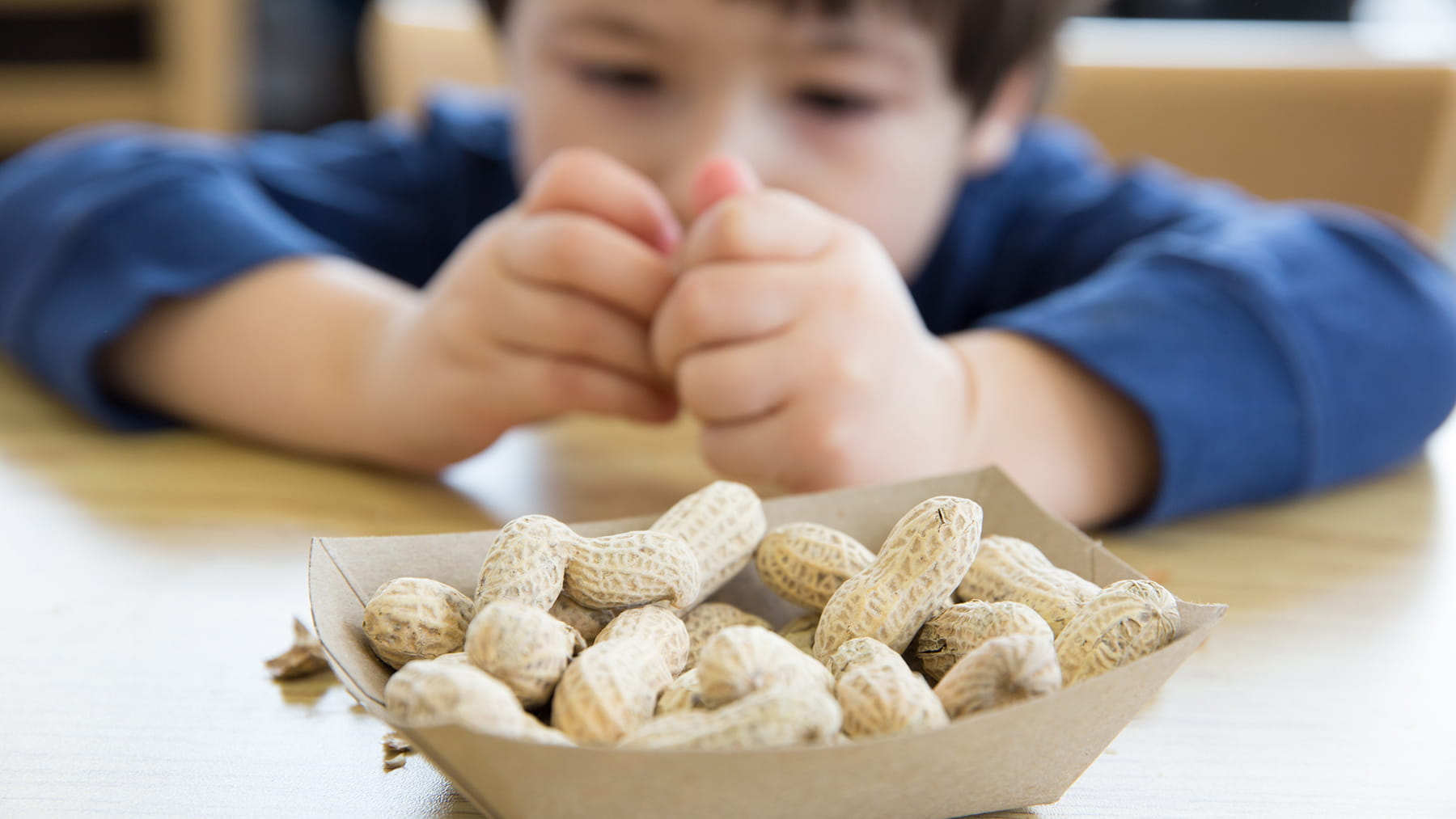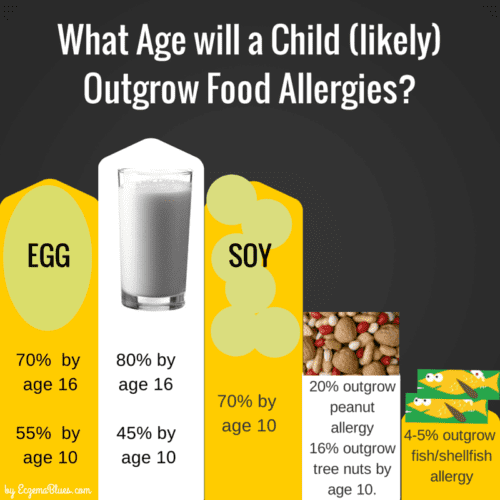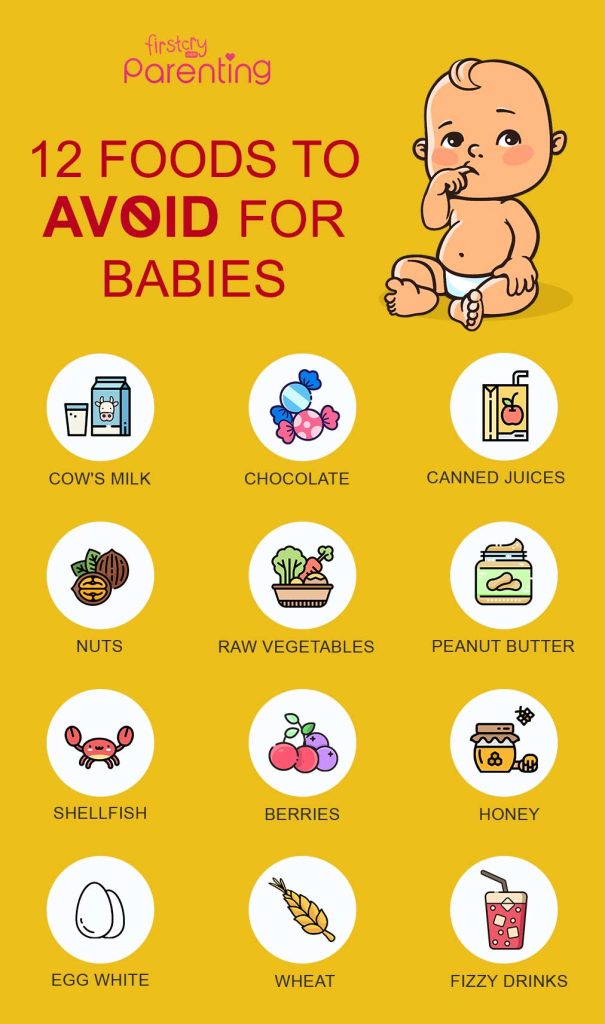Some babies outgrow food allergies, while others do not. It varies depending on the type of allergy and the child.
Food allergies are increasingly common among children. Many parents wonder if their child will outgrow these allergies. While some kids do outgrow allergies to milk, eggs, or soy, others may retain them throughout life. Peanut, tree nut, and seafood allergies are less likely to be outgrown.
Early diagnosis and management are crucial. Consulting with a pediatric allergist can provide a clearer picture of your child’s specific situation. Regular check-ups and allergy testing help monitor progress. Understanding and managing food allergies can lead to better health outcomes for your child.

Credit: wexnermedical.osu.edu
Understanding Food Allergies
Food allergies in babies can be confusing and worrying for parents. Understanding what causes these reactions helps in managing them better. This section breaks down what food allergies are, common allergens, and symptoms in babies.
Common Allergens
Babies can be allergic to various foods. Here are some common allergens:
- Milk
- Eggs
- Peanuts
- Tree nuts
- Soy
- Wheat
- Fish
- Shellfish
These foods can cause allergic reactions. It’s important to identify which foods trigger allergies in your baby.
Symptoms In Babies
Recognizing the symptoms of food allergies in babies is crucial. Here are some common signs:
| Symptom | Description |
|---|---|
| Rash | Red, itchy patches on the skin. |
| Vomiting | Throwing up food or stomach contents. |
| Diarrhea | Frequent, watery stools. |
| Swelling | Swelling of face, lips, or tongue. |
| Breathing Problems | Wheezing, coughing, or difficulty breathing. |
If you notice these symptoms, consult a healthcare provider immediately. Early detection can prevent severe reactions.

Credit: www.neocate.com
Causes Of Food Allergies
Understanding the causes of food allergies can help parents manage their child’s condition. Food allergies often develop due to a complex interplay of genetic and environmental factors. Let’s explore these causes in detail.
Genetic Factors
Genetics play a significant role in the development of food allergies. If parents have allergies, their child is more likely to develop them too. This is because certain genes make the immune system react more strongly to allergens.
Studies show that children with a family history of allergies are at higher risk. This includes not just food allergies, but also other allergic conditions like asthma and eczema.
Here’s a table to illustrate the genetic influence on food allergies:
| Parental Allergies | Child’s Risk |
|---|---|
| No allergies | 10% |
| One parent with allergies | 30% |
| Both parents with allergies | 60% |
Environmental Influences
Environmental factors also contribute to food allergies. Exposure to allergens early in life can increase the risk. For example, introducing peanut products to babies can sometimes help prevent peanut allergies.
Pollution and lifestyle factors are also important. Urban living, with higher pollution levels, can lead to more allergies. Diet and hygiene play a role too. A varied diet and good hygiene practices can support a healthy immune system.
Some key environmental influences include:
- Early allergen exposure
- Pollution levels
- Diet diversity
- Hygiene practices
Understanding these factors can help parents better manage and potentially reduce the risk of food allergies in their children.
Diagnosing Food Allergies
Diagnosing food allergies in babies can be challenging. It involves identifying specific triggers and understanding the symptoms. This process helps parents manage their baby’s diet and ensure safety.
Medical Tests
Doctors use several medical tests to diagnose food allergies in babies. The most common tests include:
- Skin Prick Test: A small amount of food allergen is placed on the skin. The skin is then pricked to let the allergen enter. A reaction indicates an allergy.
- Blood Test: This test measures the immune system’s response to specific foods by checking for allergy-related antibodies.
- Oral Food Challenge: This test is done under medical supervision. The baby consumes small amounts of the suspected allergen while doctors watch for reactions.
Allergy Specialists
Allergy specialists play a crucial role in diagnosing food allergies. These experts have specialized knowledge and experience. They can conduct detailed evaluations and recommend appropriate tests.
Parents may be referred to an allergist if the baby’s symptoms are severe or unclear. The allergist will take a comprehensive medical history. They will ask about the baby’s symptoms, diet, and family history of allergies.
Allergy specialists can also provide guidance on managing food allergies. They help create a safe and balanced diet plan for the baby. This ensures the baby gets all necessary nutrients while avoiding allergens.
Consulting an allergy specialist can provide peace of mind. It ensures that the baby receives the best care and management for their food allergies.
Managing Food Allergies
Managing food allergies in babies can be challenging but is essential. Effective management ensures your child stays safe and healthy. Below are some strategies to help manage food allergies.
Dietary Changes
Dietary changes play a crucial role in managing food allergies.
- Elimination Diet: Identify and remove allergenic foods from your baby’s diet.
- Substitute Ingredients: Use allergy-friendly alternatives to common allergens.
- Read Labels: Always check food labels for hidden allergens.
Consulting a nutritionist can help create a balanced, allergen-free diet for your baby.
Emergency Plans
Having an emergency plan is vital for managing food allergies.
- Action Plan: Develop an emergency action plan with your doctor.
- Medication: Keep antihistamines and an epinephrine auto-injector handy.
- Education: Teach family members and caregivers about the allergy and emergency procedures.
Ensure that everyone knows how to recognize and respond to allergic reactions quickly.
Chances Of Outgrowing Allergies
Understanding whether your baby will outgrow food allergies is important. Many parents hope their child will overcome these challenges as they grow. The chances of outgrowing allergies depend on several factors.
Age Factors
Babies and toddlers often have food allergies. Some children outgrow these allergies by the age of five. The likelihood increases as they get older. Teenagers and adults are less likely to outgrow food allergies.
| Age Group | Chances of Outgrowing |
|---|---|
| Infants | High |
| Toddlers | Moderate |
| School-age children | Lower |
| Teenagers | Low |
| Adults | Very Low |
Types Of Allergies
Different food allergies have different chances of being outgrown. Here are some common food allergies and their likelihood of being outgrown:
- Milk Allergy: Many children outgrow this by age three.
- Egg Allergy: Often outgrown by age five.
- Peanut Allergy: Less likely to be outgrown, but possible.
- Tree Nut Allergy: Rarely outgrown, but some children do.
- Fish and Shellfish Allergy: Very unlikely to be outgrown.
Tracking your child’s progress is crucial. Regular check-ups and allergy tests can provide updates. Early intervention and monitoring can help manage the condition better.
Expert Opinions
Understanding whether your baby will outgrow food allergies can be challenging. Experts offer valuable insights that can help guide you through this journey. Let’s explore what pediatricians and nutritionists have to say.
Pediatricians’ Insights
Pediatricians play a crucial role in managing food allergies. They often observe that many children outgrow allergies to milk, eggs, and soy by age five. Yet, allergies to nuts, seafood, and wheat can persist longer.
Early diagnosis and regular monitoring are vital. Pediatricians may recommend allergy testing to track changes over time. They also advise parents to keep a detailed food diary. This helps identify triggers and monitor any allergic reactions.
Nutritionists’ Advice
Nutritionists emphasize the importance of a balanced diet, even with food allergies. They recommend alternative foods to ensure your baby gets essential nutrients.
| Allergy | Alternative Foods |
|---|---|
| Milk | Almond milk, soy milk, oat milk |
| Eggs | Flaxseed, chia seeds, applesauce |
| Wheat | Rice, quinoa, corn |
Elimination diets can help identify problematic foods. Nutritionists often suggest reintroducing foods gradually. This way, you can observe any allergic reactions.
Both pediatricians and nutritionists stress the importance of education. Understanding food labels and cross-contamination is crucial. Always consult with healthcare professionals before making dietary changes.
Latest Research
Parents often worry about their baby’s food allergies. The good news is research brings hope. Scientists are discovering new ways to help babies outgrow allergies.
Promising Studies
Recent studies show that early exposure to allergens may help. Introducing small amounts of allergenic foods early can train the immune system.
A study in the Journal of Allergy and Clinical Immunology found that 80% of infants with egg allergies outgrew them by age 5. Another research reported similar results for milk allergies.
Researchers are also exploring the role of probiotics. Probiotics may help build a stronger immune response. A study showed that infants given probiotics had fewer allergies.
Future Treatments
Scientists are developing new treatments for food allergies. Oral Immunotherapy (OIT) is a promising method. It involves giving small, increasing amounts of the allergen.
OIT has shown positive results in peanut allergies. Children receiving OIT could tolerate more peanuts over time.
Researchers are also looking into epigenetic therapies. These treatments aim to change how genes express allergic responses. This could provide long-term solutions for food allergies.
Another exciting area is the development of vaccines. Vaccines could prevent food allergies before they start. Scientists are optimistic about these new approaches.
Supporting Your Child
Helping your child navigate food allergies can be challenging. With the right support, your child can manage their allergies and live a full life. Providing educational resources and emotional support can make a big difference.
Educational Resources
Knowledge is power, especially with food allergies. Equip yourself and your child with the best resources available. Here are some ways to do that:
- Books: Find books about food allergies for kids and parents.
- Websites: Trustworthy websites offer up-to-date information.
- Support Groups: Join local or online support groups for shared experiences.
- Healthcare Providers: Regular visits to allergists for expert advice.
Emotional Support
Food allergies can be emotionally taxing for children and parents. It’s crucial to offer emotional support. Here are some strategies:
- Listen to your child’s concerns and fears.
- Teach your child how to explain their allergies to others.
- Encourage your child to participate in normal activities.
- Seek professional counseling if needed.
Building a strong support system helps your child feel confident and safe.
:max_bytes(150000):strip_icc()/GettyImages-969717226-5c0d8dcd46e0fb000164f410.jpg)
Credit: www.verywellhealth.com
Frequently Asked Questions
Will My Baby Grow Out Of His Food Allergies?
Some babies outgrow food allergies, especially milk, egg, soy, and wheat allergies. Others may have them lifelong. Consult a pediatrician.
How Long Does It Take For Baby Food Allergy To Go Away?
Baby food allergies usually resolve within a few days to a week. Consult a pediatrician if symptoms persist.
At What Age Do Food Allergies Go Away?
Food allergies often go away by age 5. Some persist into adulthood, especially nut and seafood allergies. Always consult a doctor.
Is It Possible For A Child To Outgrow A Food Allergy?
Yes, a child can outgrow a food allergy. Many kids outgrow allergies to milk, eggs, and soy by age 5.
Conclusion
Many babies do outgrow food allergies as they grow older. Consult with your pediatrician for the best guidance. Monitor symptoms and introduce new foods carefully. Always stay informed and proactive to ensure your child’s health and safety. Understanding and patience are key in managing food allergies effectively.


